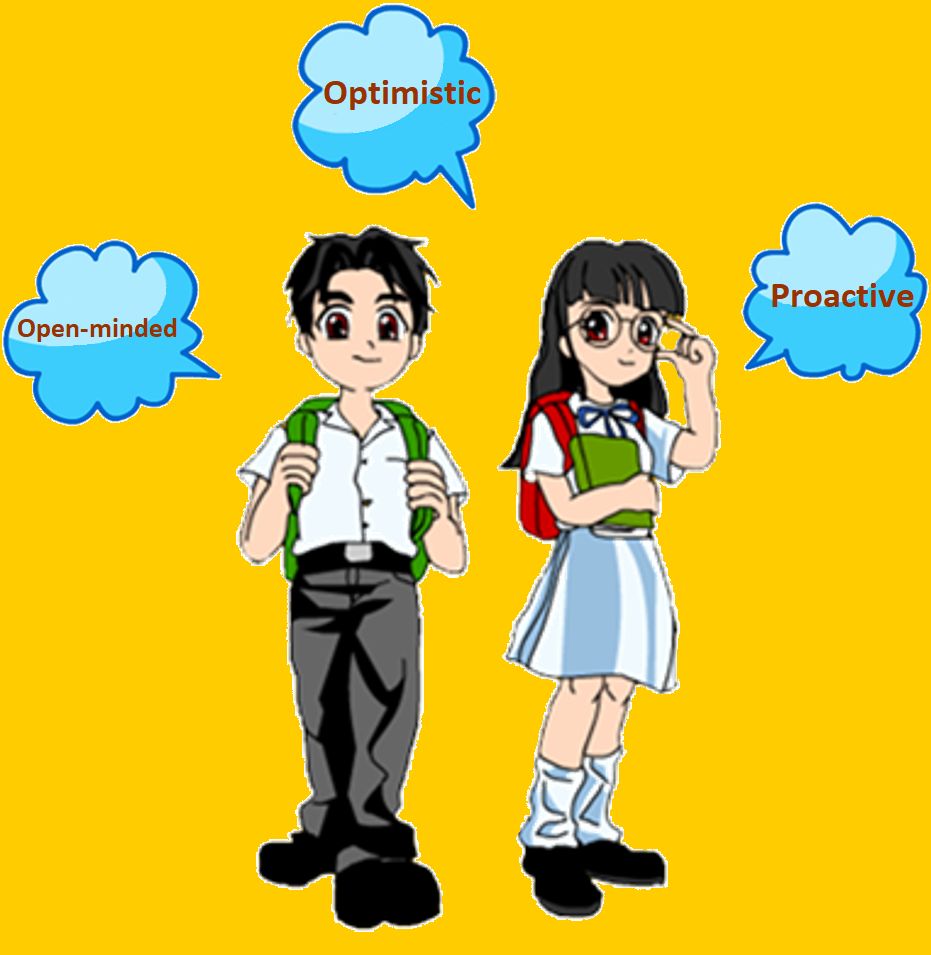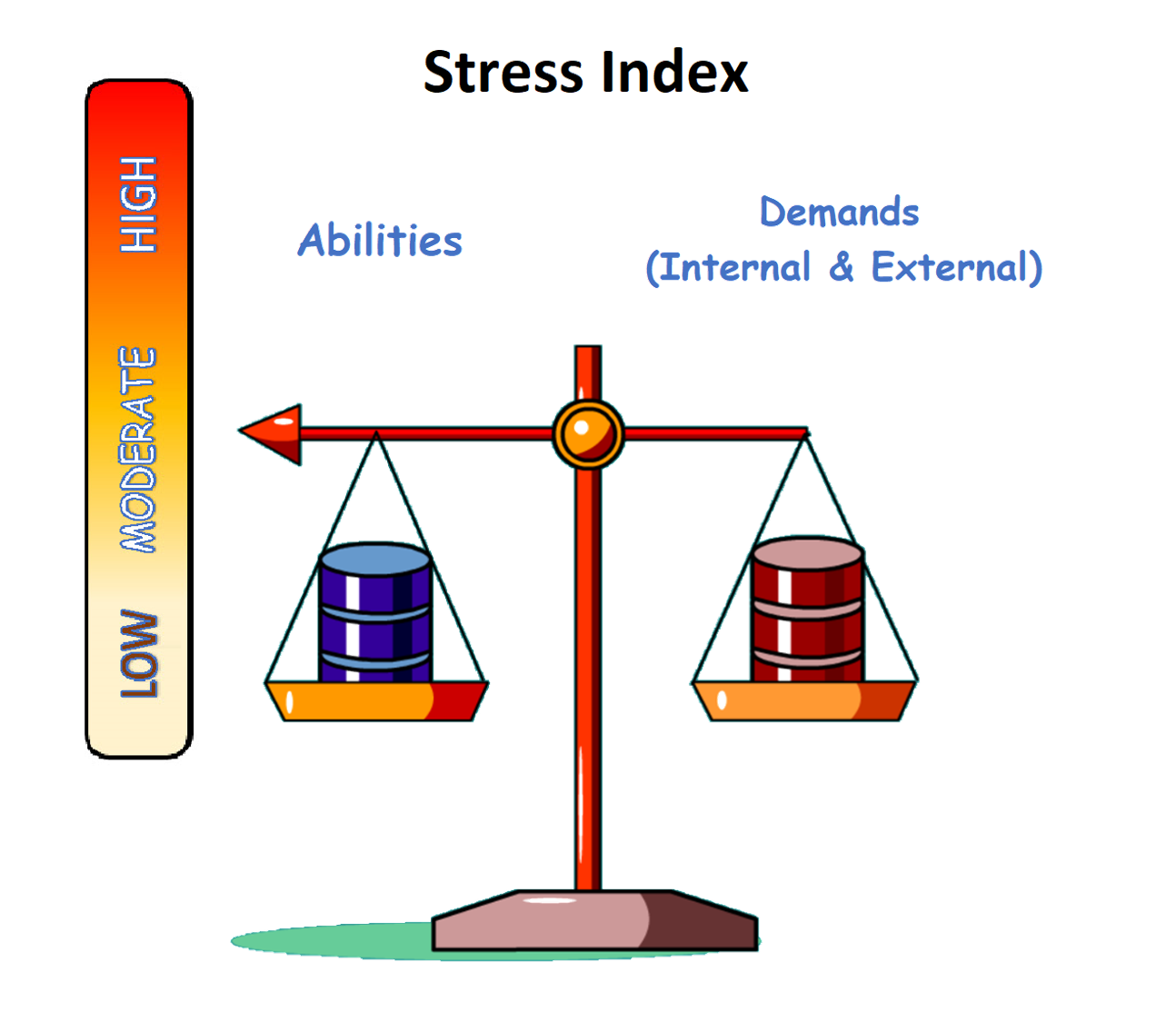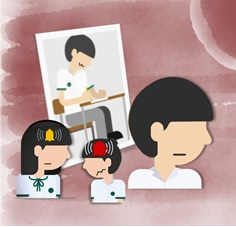Mental Health Series
Problem-solving
Learning objective:
Enhance one’s problem-solving ability by learning the optimal attitude and steps of problem solving.
Core message:


- Do not avoid facing difficulties by exaggerating your problems and underestimating your abilities. Attempting is a good start in problem solving.
- When facing difficulties, one should be optimistic, open-minded and proactive. One should also believe that there are solutions in most situations and be willing to accept opinions and suggestions from others.
- Five steps in problem solving:
- Keep calm
- Identify the problem
- Look for possible solutions
- Choose the best solution
- Evaluate the solution and event
Remarks: The talk is conducted in Cantonese only
Summary
Emotions
Learning objective:
Learn the appropriate ways of expressing and handling emotions to better manage our mood.
Core message:


- Recognising and identifying the different kinds of emotions help to accept ourselves when experiencing different emotions.
- It is necessary to learn how to express emotions appropriately, whether positive or negative. The principles of appropriate expression of emotions include Be genuine, Don’t harm others, Don’t harm oneself, Don’t damage. Respect others, oneself and rules.
- Always review the accuracy of our beliefs and learn positive thinking in order to enhance our abilities to manage emotions
Remarks: The talk is conducted in Cantonese only
Summary
Stress Management
Learning objective:
Recognise stress and learn how to manage it appropriately.
Core message:


- Stress is a subjective feeling. When a person is facing external or internal demands but without enough ability to cope with them, it may cause physical and psychological discomfort. This is called stress.
Appropriate level of stress motivates us to improve, develops our potentials and promotes personal growth. However, too much stress is harmful to our physical and psycho-social wellbeing. - The key to coping with stress is to identify the sources of stress, and then use proper ways to handle the stress, such as adjusting the level of demands and strengthening our coping abilities.
- Be cheerful and engage in positive thinking and self-talk can enhance our coping abilities.
- If the stress symptoms continue to affect daily life, such as persistent insomnia or prolonged depression, it is necessary to seek help from friends, social workers or teachers.
Remarks: The talk is conducted in Cantonese only
Summary
Assertiveness training
Learning objective:
Learn about effective ways to express oneself with assertiveness which can strengthen an individuals’ abilities to express their stance.
Core message:

- Expressing one’s stance assertively can maintain one’s rights and needs while also respecting the opinions and feelings of others.
- When expressing ourselves firmly, we need to clearly and explicitly state our thoughts, feelings and opinions on the matter. At the same time, we should acknowledge and show understanding of the other party’s position, needs and feelings, making them feel comfortable and at ease.
- Assertive expression does not mean blindly insisting on one’s own views or rejecting others.
Remarks: The talk is conducted in Cantonese only
Summary
Anger management
Learning objective:
Learn that managing feelings of anger can enhance one’s ability to promote emotional wellbeing.
Core message:


- Anger arises when desires are thwarted or there is a gap between our expectations and reality. Being aware of our own feelings of anger can help us manage our emotions.
- Excessive anger can make a person impulsive, even leading to losing control of our behaviours and overreacting to minor issues. The consequences can be severe.
- Taking a temporary break from the situation, or engaging in self-talk can help us calm down and reduce the negative words or actions that may arise from anger.
- As bystanders, we should remind ourselves and those present to stay calm. If we are unable to resolve the situation, we should seek assistance promptly.
Remarks: The talk is conducted in Cantonese only
Summary
Analytical thinking skills
Learning objective:
Learn the attitude and skills of analysis in order to enhance the ability of independent thinking.
Core message:


- Objective analysis can improve our ability to think independently so as to make more appropriate or accurate judgments.
- The technique of objective analysis requires us to first distinguish between "facts" and "opinions" as well as verifying the authenticity of data, before making a decision.
- The attitude of objective analysis should be serious, with minimal personal subjective feelings and prejudices. Be open-minded and seek verification constantly.
- Analyse carefully and do not follow unproven information. Even decisions made after careful analysis may have undesirable consequences, for which we will be responsible and accountable for. We can take it as a reference and make better judgement in the future.
Remarks: The talk is conducted in Cantonese only
Summary
Coping with adversity
Learning objective:
Learn the methods to cope with adversity to increase resilience.
Core message:


- When we face adversity, we tend to have negative thoughts and feelings, such as feeling incompetent, lack of support and hopeless.
- When we are restrained by negative thoughts and emotions, we can use different methods to help ourselves break through the restraints, thus better handling the adverse situation.
- “ROAD” can help us cope with adversity. Reflection - Recognise the current hardship and set goals to break through from it. Optimism - Believe that we have ways to solve the problems. Abilities - Make good use of our abilities and resources. Development - Strengthen our morale and determination to overcome difficulties.
Remarks: The talk is conducted in Cantonese only
Summary
Managing Exam Anxiety: Coping Strategies for Students
Learning Objective:
Understand exam anxiety and its coping methods to alleviate its negative impacts.
Core message:


- Anxiety is a natural emotional response when facing threats and stress.
- Relaxation techniques can effectively reduce the negative impact of stress on our body and mind.
- Practising healthy habits, talking to others and learning positive thinking can improve the ability to cope with stress.
- Excessive anxiety can interfere with normal life and seeking help from professionals may be necessary.
Remarks: The talk is conducted in Cantonese only
Summary
Changes during Adolescence
Learning Objective:
To provide students with in-depth knowledge on the physical and psychological changes during puberty and how to cope with them.
Core message:

- Physical changes during puberty are natural and there is no need to compare with others.
- When troubled by pubertal changes, seek help and do not blindly believe in myths.
- Adolescents long for independence, but they are still relying on their parents and may easily clash with older generations.
- Express one’s inner feelings, needs and expectations can improve the acceptance from parents. We can also be more confident and independent if we improve our mutual understanding with parents and learn to compromise.
Resist Temptations
Learning objective:
Recognise the harms of smoking, alcohol drinking and drug taking in order to enhance our refusal skills in facing temptation and make a smart choice.
Core message:


- Tobacco and alcohol are classified as Group 1 carcinogens which cause various types of cancer.
- Drug taking not only cause permanent damage to the brain function but also causes damages to other body organs.
- When you are tempted to smoke, drink or take drugs, you should use the refusal skills - "seven resist temptations methods" flexibly to reject the temptation.
- Do not use smoking, alcohol, or drugs to relax or escape from problems. Seek help from parents, teachers, social workers or professionals instead.
Remarks: The talk is conducted in Cantonese only
Summary
Understanding Anxiety and Stress-Reduction Techniques
Learning Objective:
Raise students’ awareness of anxiety and stress, learn evidence-based stress reduction methods, and understand how to prevent excessive stress.
Target audience:
Secondary school students
Content:

- Learn about anxiety and stress.
- Learn about the signs of anxiety and stress and their impact on physical and mental health.
- Recognise how to prevent and reduce excessive stress.
- On-site practice of stress reduction method.
- Introduce relevant community resources (self-help information).
Remarks: The talk is conducted in Cantonese only

Anger Management Strategies to Help You Calm Down
Learning Objective:
Learn about anger and anger management skills to reduce the occurrence of destructive reactions.
Target audience:
F.1 to F.6 students
Content:
- Understanding anger.
- Increase motivation to manage anger.
- Skills to cultivate a calm body and mind.
- Ways to transform anger.
Remarks: The talk is conducted in Cantonese only
